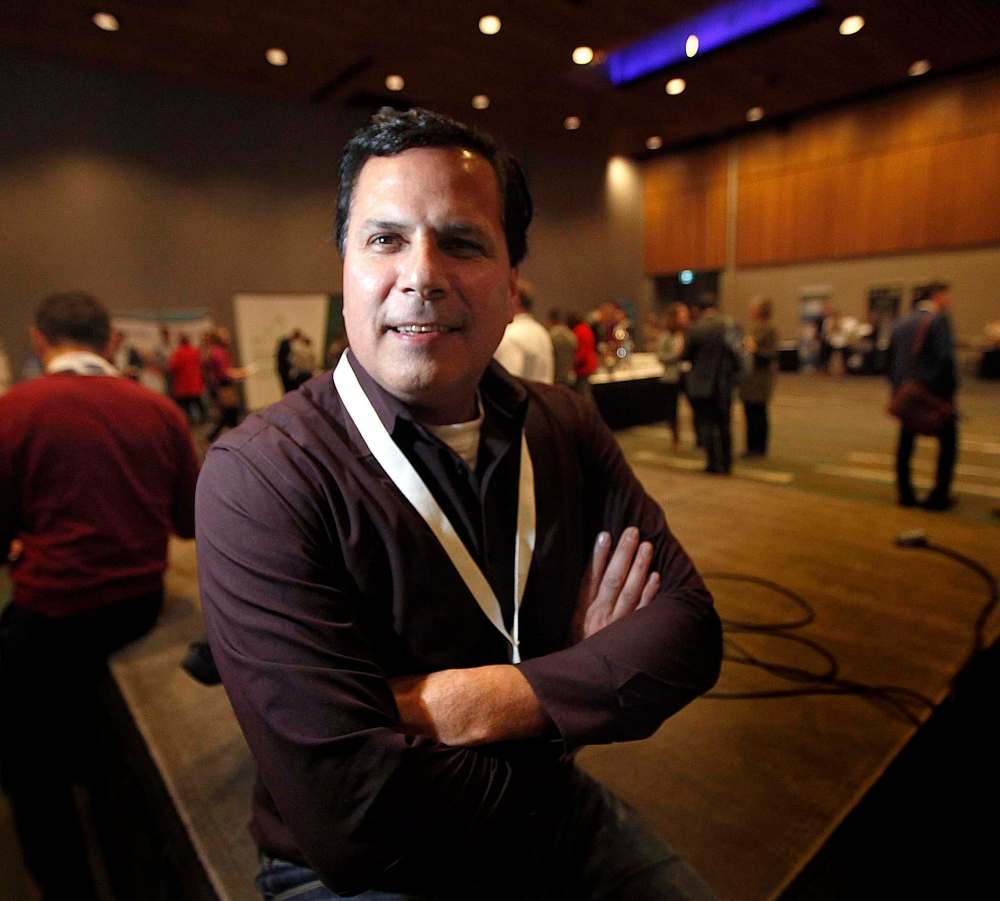Clean-tech sparking interest in province
Experts urge Canadian companies to take lead in environmental industry
Advertisement
Read this article for free:
or
Already have an account? Log in here »
To continue reading, please subscribe:
Monthly Digital Subscription
$1 per week for 24 weeks*
- Enjoy unlimited reading on winnipegfreepress.com
- Read the E-Edition, our digital replica newspaper
- Access News Break, our award-winning app
- Play interactive puzzles
*Billed as $4.00 plus GST every four weeks. After 24 weeks, price increases to the regular rate of $19.95 plus GST every four weeks. Offer available to new and qualified returning subscribers only. Cancel any time.
Monthly Digital Subscription
$4.99/week*
- Enjoy unlimited reading on winnipegfreepress.com
- Read the E-Edition, our digital replica newspaper
- Access News Break, our award-winning app
- Play interactive puzzles
*Billed as $19.95 plus GST every four weeks. Cancel any time.
To continue reading, please subscribe:
Add Free Press access to your Brandon Sun subscription for only an additional
$1 for the first 4 weeks*
*Your next subscription payment will increase by $1.00 and you will be charged $16.99 plus GST for four weeks. After four weeks, your payment will increase to $23.99 plus GST every four weeks.
Read unlimited articles for free today:
or
Already have an account? Log in here »
Hey there, time traveller!
This article was published 30/11/2017 (2976 days ago), so information in it may no longer be current.
Clean technology and environmental industries have not always figured prominently in Manitoba’s diversified economy, but that’s starting to change.
As the global decarbonization movement becomes crucial in dealing with climate change, the clean-tech sector is becoming the target of massive amounts of innovation spending in Canada and around the world.
It’s estimated that clean-tech was a $1-trillion global industry in 2016 that will hit US$2.5 trillion by 2020, with US$90 trillion likely to be invested in green infrastructure in the next 15 years.

The two-day Western Canada Cleantech Innovation Forum in Winnipeg this week — the largest event ever put on by the Manitoba Environmental Industries Association (MEIA) — is just a small example of just how crucial and current the interest in clean-tech is.
In organizing the event, Margo Shaw, MEIA’s executive director, was surprised at the sheer volume of enterprise in the province.
“I learned about all sorts of companies working in the field that I was not aware of,” she said.
“And I’m someone who is supposed to have her finger on the pulse of what’s going on.”
Environmental industries and clean-tech activity in Manitoba generated $2.5 billion in revenue last year.
In addition to traditional environmental companies dealing with hazardous waste and water treatment, there are a lot of other new companies doing work that will enhance the environment.
There is still a debate as to what constitutes clean-tech to the extent that the MEIA is considering re-branding.
In an introduction to clean-tech at the conference, Bruce Dudley, senior vice-president of Delphi Group, an Ottawa-based consultancy in sustainability and environmental risk management, said clean-tech is any process or product that has environmental benefits.
Dudley said Canadian companies should go all out to develop processes across virtually all sectors from natural resource and energy to pharmaceuticals and agriculture.
“Most of the players in the clean-tech space are small- and medium-sized entities,” Dudley said.
“It’s important that they stand up and be counted because there is more money in play than ever in the history of the country.”
Both he and Thomas Homer-Dixon of the University of Waterloo — who gave a powerful presentation about the “existential threat” the world faces and the kind of opportunities that exist in clean-tech — advocated for Canadian industry to take the lead in developing new technologies that could be exported around the world.
Darrell Brown, the former chairman of the Aboriginal Chamber of Commerce and owner of Kisik Commercial Furniture in Winnipeg, has become a new recruit to the clean-tech industry.
After becoming part of an intensive training program, Brown is currently working as an adviser to Lumos Energy on a micro-grid project in Gull Bay First Nation north of Thunder Bay, Ont., that will dramatically reduce the reliance on diesel fuel to provide electricity to the community of 135 people.
The $7-million micro-grid, solar array and battery storage system will reduce that community’s diesel consumption by 25 per cent when the project is completed in a year with further reductions in ensuing years.

There are at least four First Nations in Manitoba that rely entirely on diesel fuel to power their communities.
Being able to providing renewable power to remote communities in Canada is the kind of technology that is much in demand in remote locations all over the world
“This will be one of the first First Nations in Canada to do a new energy grid that they will own and operate,” Brown said.
“They will never get on the existing energy grid.”
It’s those kinds of innovations — and the increasing demand and willingness to invest in them — that makes Homer-Dixon believe the shift to clean technology might start taking off faster than people had previously predicted.
For instance, he said none of the experts anticipated the rapid decline in the cost of solar energy.
He said it is very significant that even though the U.S. pulled out of the Paris climate accord, the rest of the world remains committed.
“What is happening in the U.S. is anomalous,” he said.
He believes that the next general-purpose technology transition — following the introduction of rail and electricity in the 19th century, the internal combustion engine early in the 20th and the personal computer later in the 20th century — will be green energy technology.
Homer-Dixon said, “To the extent the global economy is in a low-growth track since the 2008-09 financial crisis, it is possible that clean-tech is the next surge of technological innovation that will break us out of the low-growth track and may be the source of major productivity and innovation. We just have to do it.”
martin.cash@freepress.mb.ca
History
Updated on Friday, December 1, 2017 12:25 PM CST: makes correction

